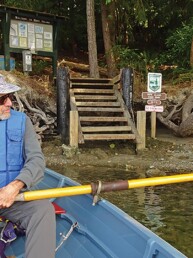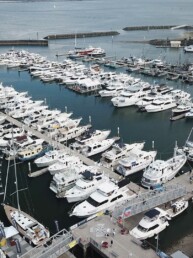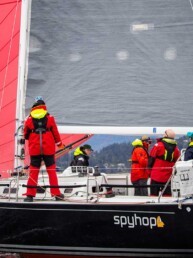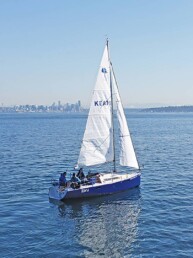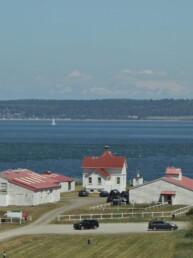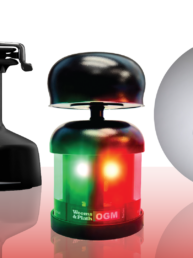 From the June 2009 issue of 48° North by Lance Ekhart
From the June 2009 issue of 48° North by Lance Ekhart
A good traveler has no fixed plans and is not intent on arriving.
Lao Tzu, 570-490 BC
I felt all dressed up with nowhere to go. I planned to leave two days earlier but thick fog prevented it. At least I had made it from Bamfield to Effingham Bay in Barkley Sound so I wouldn’t go stir-crazy waiting to begin my Big Adventure, singlehanding offshore up the West Coast of Vancouver Island, BC. I had spent two years preparing Shariyat, my Columbia 26 MkII to cruise offshore but hadn’t been past the Gulf Islands yet so this was to be the big test. Perhaps more importantly, this would be a trial for me as well. Although a life-long sailor with much offshore experience, that was ten years or more ago and the unfortunate demands of life had taken me far from the cockpit since those youthful and adventurous days. Was this where I wanted to put my energies again? Would this trip re-awaken the old joys and eager anticipation of being at sea with all its wonders, challenges and surprises? Or would I now only recognize the ordeals it could hold and find myself asking why anyone would want to do such a harebrained thing? I had to find out, this year, before I put any more efforts into such an idea.
The usual way to travel the West Coast of Vancouver Island is to go North up the east side taking advantage of the currents and down the outside to take advantage of the prevailing Northwesterly winds but this wasn’t the experience I wanted. It was the headwinds and beating to weather in the open ocean that I needed to experience again to decide on my future plans with this boat. A mid-September departure for sailing up the outer coast was not my first choice of timing but I was happy it was now happening at all.Maybe I would find less fog this time of year and perhaps it was fortuitous as this summer had been one of stronger westerlies and numerous gales. At least I would find no crowds of cruising boats in the favorite anchorages. But the Equinox can often bring the first of the countless gales that rule this coast in the darker months of the year. And maybe I needed to experience this as well to make my decision. I was reminded of Irving Johnson sailing “Peking”, the last of the old square-riggers around Cape Horn asking for a first-class storm there so he could fully experience it. No I wouldn’t ask for that, but it could happen sure enough along the way.
I awoke to a welcomed surprise – no fog. I had been hearing the sea-lions during the night from their wild outer lair on the edge of Barkley Sound and I decided to go find them on my way out to sea. Although it was overcast and misty that early morning, I could see across the couple miles to the far side of the island group, enough visibility to make my departure at last. It was so quiet and still it was hard to see where the shore ended and the water began as the reflection was so perfect in the faint dawn light. I hardly wanted to disturb the scene by starting the motor and lifting the anchor but the kingfishers were making their raucous morning sorties and so I joined them in disrupting the peace. I picked my way through the islet/rock-pile that is the Broken Group and followed the haunting sounds and soon came across them. What a spectacle of sight and sound! Hundreds of big brownish half-upright beasts swaying and butting breasts like drunken sailors amidst the chorus of their loud morning song of prehistoric grunts, barks and gurgles, all echoing like “sen-surround” off the islets around me. I drifted far enough away from them to not disturb their reverie and was captivated by the natural primitiveness of my surroundings. This was the wildness I had so missed in the 9 years since I had left Alaska and was the restoration I needed from this outer coast experience. But a bigger adventure was yet ahead of me and it was time to begin. I thanked the sea lions for their hearty send-off, motored off around the fringing islet and into the open Pacific Ocean, once again.
There was no wind at all to greet me into the long, deep Pacific swells as I took my departure off Sail Rock. I wanted to quickly make miles offshore to get beyond the shipping lanes where I could safely catch some sleep that night so I continued to motor SW for four hours under autopilot until I could begin sailing. About 20 miles out I had spotted the La Perouse sea-bouy directly ahead and watched with increasing interest as it continued directly in my path. Finding it hard to believe I might actually run into it, the odds seemed impossibly low, I held course and only when direct center-punch was imminent I directed the pilot to dodge it. That was an interesting lesson I would certainly remember!
Finally, the wind quickly came up to 15+knots out of the WSW, which meant the preferred port tack would parallel Vancouver Island and not send me directly offshore. At sea it can be hard to plan ahead as you have to do what the sea and weather give you. I could see ships way offshore of me and thought I could stay inshore of them instead. As the wind held the seas became steeper and very confused, probably as a result of being over La Perouse Bank with its shallower depths and the one knot contrary current. Shariyat with her fin keel and spade rudder had no problem at all with it. Having changed down from the 150% genoa to the working jib, she was bounding and crashing over the cresting seas going to weather at nearly 6 knots. I, on the other hand, was a different story. Immediately I was confronted by my greatest concern. Seasickness! I could feel it coming on with the violent motion in these conditions. I had no crew besides Fred the auto-pilot and “he” was of no moral support whatsoever. This wasn’t a race, but as much as I regretted it I had to slow the boat down or I would be worthless shortly and Fred’s skills were very limited. Reefing the main helped but not enough. I put in the second reef and Shariyat slowed to 4.5-5 knots, but the voyage was now one of survival, not enjoyment.
Seasickness was nothing new to me. Throughout my sailing adventures offshore it has often confronted me the first couple of days out beginning a passage. I always hoped the first few days would be easy to allow me to gain my sea-legs, but it never happened, especially departing from the West Coast where seas are the worst, as you crash to weather to gain sea-room. Only by experience did I know that it would end after a while. When you are trapped in it you think it never will. But that was way back then and this was now in a small, light and fast boat. Already I was thinking how stupid I was to want to go to sea again and face this horror and the journey was just hours old! But I knew what to do: slow down, hand steer, focus on the horizon, conserve energy, drink water, stay warm, eat what I could and try to sleep when I could. This gave me something to focus on while I prayed my sea-legs, unused for so long, would come back to me. The problem was that this voyage was only meant to be a few days in duration. Would I ever find them in time?
I carried on as best I could, trying to be thankful that at least the boat, our course and speed were doing well, if not myself. Fortunately conditions held steady until nightfall and the boat was well snugged-down and no further sail changes were necessary. I forced myself to look forward to heaving-to for the night, hoping that would quiet the motion and I could lay down and rest. I made myself eat some soup I had made up prior to leaving and I felt better.
Heaving-to is so easy and effective! I put the helm over to come about, ran out the mainsheet some and then lashed the helm to leeward. In seconds the jumping and crashing turned to gentle rocking and pitching. I had held on sailing until 2230 hours when the wind slacked a bit and I had seen no ships for hours, although I could see the glare from far-off fishing boats, probably content to stay put and fish, I hoped. I called Tofino Traffic Services on VHF channel 74 to tell them where I was so they could alert the ships that they husband up and down the Vancouver Island coast, of my presence in the area. They had to ask me twice how big my “ship” was and the speed I was making: 1.5 knots, mainly from the set of the southeast current. I tried to sleep but my nausea, the excitement of a new journey, the clink-clink-clunk of things shifting about in lockers and the anxiety from thinking of possible oncoming ships made it difficult. The wind gods were good to me though as they continued to blow, albeit softly, and the backed sails stayed filled enough to make a comfortable night.
By morning I had managed to get a few hours of real sleep, in between getting up and having a look around every hour or so. I knew that today’s ships could be over the horizon and on top of me within 20 minutes, but as a singlehander, that was a risk I had already decided to take. The ships were a small enough risk but I knew the dangers of no sleep would ultimately do me in. The constant overcast of the previous day had a higher ceiling now so I thought it might break later and provide some sun. I got Shariyat back under way in a light breeze, the sea having laid down overnight and the boat’s motion was much better. I had been keeping as accurate a dead-reckoning plot as I could, made much simpler with Fred steering an accurate compass course and not chasing wind shifts back and forth, but I plotted my positions from the GPS as well and the morning’s fix showed that we had lost 8 miles overnight while hove-to.
Then I noticed the miracle: I felt good and even rested. “Hallelujah,” I grinned and shouted to my private world. How quickly things can change from heaven to hell, and back again. It was like waking up from a very bad dream and realizing you’re not there after all. So, maybe I’m not really so dumb to be out here again!
The wind stayed light that whole second day which was a blessing as it let me fit back into my long lost sealegs. Under the genoa again Shariyat and I played the wind shifts, tacked on the headers and despite the gentle breezes still managed to average 4 to 5 knots while working our way out to 50 miles offshore. The sun came out from time to time, playing hide and seek with the low clouds bunched here and there. It had been four days without sun and I felt my spirits lift again. This became a truly wonderful day as even the sea creatures came by to welcome me back to their world. First, it was two whales, humpback I think, that slowly crossed my path so close ahead I had to alter course to avoid them as they raised their giant tails and sounded just 50 feet away. Then a group of dolphins came by jumping high out of the water as if to say hello. An hour later I came upon a big sunfish basking lazily on the surface, its upper fin seemingly waving at me. Two sharks made a brief appearance and then finned away. Occasionally an albatross adeptly dipped and banked in and out of the wave-tops soaring, wings seemingly motionless, as it came to inspect this visitor to its lonely world. Squalls formed and dissipated around me, and sometimes brought a little rain, but only for a few minutes and I didn’t mind as they brought a little bit more wind with them to help me along.
My heart rejoiced with the richness of the constantly changing scenery, all put into an enhanced three dimension by the ever-present Pacific swell, which would raise me up high on a watery mountain then drop me down into a moving valley. The swell defines time at sea. Clocks mean nothing but an arbitrary means of keeping a position. Each swell defines a unit of real sea-time and I remembered the magic of it from my earlier days. I sat watching the sea and found my breath matching its rhythm. All thought seemed to drift away as the swell began to enter my very soul and then it happened like I had so joyfully remembered. Like rejoining a lost lover from a time back before memory, I made the transition and the sea and I were dancing as one, once again. Now my driving need to come out here again made perfect sense although in a way that can’t really be described in words.Clock time stood still. I had returned home!
The breeze, along with my reverie, held into the night and I was reluctant to end my caress with the elements but I knew I must sleep. If we could keep sailing at this speed we could make 35 miles instead of losing another eight or so to the current hove-to. So, I left it to Fred and laid down. There was no need to set an alarm to get up and look around as I didn’t feel tired and couldn’t sleep anyway. I got up often when the wind direction had eluded Fred and gave him a new course.
I did finally fall asleep and when I awoke I found Shariyat charging along like a freight train (her previous name) right on course, which would itself have been enough to make me happy. But the sea was alive like one giant living organism, alit, glowing and sparkling green in an otherwise dark and moonless night. I knew it was intense bio-luminescence I’ve seen many times before, but not like this. This had an enchanted appearance. At night the sea is usually darker than the sky, unless there is the whiteness of breaking seas. Now the sea was almost bright as lit by some sun way below its depths with a light green glow. Looking closely over the side I could see the trillions of individual sparkles like stars in an endless galaxy down beneath my boat giving me another rare, three-dimensional view of my watery world. I thought of poor Fred stoically holding a course in his simpleminded manner oblivious to the display around us and wondered if any artificial intelligence we ever do build would ever be able to fully appreciate the awe and splendor I was witnessing. I hoped not. I went up on the foredeck and watched as Shariyat raced up to a school of small fish that would suddenly all shoot away like fireworks. What was especially eerie though was the way Shariyat’s bow wave would break into an intense curtain of brightness behind the big genoa which lit the sail and then bathed the entire boat in green, pulsing on and off like a beacon as we bounded over one wave and into the next. I was captivated as if riding a magic carpet, flying through the space of some new and different universe. The words from a Loreena McKennitt song came into my mind, “Cast your eyes on the ocean. Cast your soul to the sea. When the dark night seems endless. Please remember me.” Some very deep “remembrance” stirred strongly inside of me as I was being embraced by who/whatever the “me” was in her words as this wondrous beauty was caressing my soul this magical evening. Clock time had stopped for me again, for how long I couldn’t tell. I knew I needed my sleep but I needed this more. I finally went below and hung out in that restful but not quite asleep state for most of the night, occasionally falling over the edge into a real dream, content with it all.
Dawn of day three saw an even more broken sky and I was grateful the light winds had held, even though we were often down to less than 2 knots. I had found Fred’s’ limit, at ¼ knot he got frustrated and quit. Soon it was even prettier than the day before as well defined larger squalls loomed all around like living beings with bright writhing tops playing in the sunlight and dark vertical walls raining below.Squalls play with sailboats like cats with a mouse. They come out of nowhere and blindside you with strong shifting winds when they see you are flying full sail. They form to weather of you, puff up and flex their muscles and threaten to blow you down so you shorten sail in response only to have them laugh at you and disappear in front of your eyes. In one Transpac race on Pacifica we went through 4 or 5 squalls having taken the big spinnaker down in fear of them only to have no wind increase at all or even a diminished wind in their wake. So, for the next squall, we left it up and were hit with 40 knots. The spreaders went in the water while I fumbled for the sheet on the cockpit winch now a foot underwater. When it was over we had no spinnaker. They know and they laugh.
About midday the wind died altogether following a small squall and stayed away for five hours. Landsmen think gales and storms are the worst thing at sea but they aren’t for a well-prepared boat. It is being becalmed in a small boat that will drive a sailor insane, especially if there is still a sea running when the wind quits as there was this time. Leaving the sails up will dampen the rolling but when they slap across to the other side in response it feels like the rig will shake right out of the boat and the strain on the sails will take years off their lives if not split them right in front of your eyes. So you take them all down and you have two choices. You can stay on deck and watch the hideous pitching and rolling, gunnel to gunnel, until your eyes feel like popping out of your head trying to keep them on the horizon. Or you can go below and lay down and try to sleep while it sounds like being inside a washing machine that someone has dumped all your mechanics tools into as everything you so neatly stowed comes adrift and your drawers and lockers rearrange themselves. Storms are easier to mentally prepare for than this and at least you have something to challenge you and keep your attention. There is nothing you can do when becalmed. I even considered leaving the boat and sitting in the dinghy where the motion might be better. Standing on deck I had to laugh at the remarkably wild and quick motion, the like I had never seen before. I went below to attempt sleep and concentrated on the words: “This is OK, I am having fun, thank you” over and over and over… and amazingly, I eventually did fall asleep for over two hours.
I woke up when the wind generator started spinning. I was surprised to find the cabin sole wasn’t covered with all that was once stowed away. I went up to make sail again and found the squalls still there, watching and conniving, no doubt. I figured they would wait till I raised sail and then take the wind away again but they didn’t. We were on track and hell had quickly turned back to heaven once again. It seemed to me that old sailors have learned how to quickly forget the bad times and reminisce only about the good, otherwise they wouldn’t still be sailors! The wind was up to about 12 knots and it was perfect ocean sailing. The sea on top of the big swell was down and we were doing a smooth 6 knots under genoa with the late afternoon sun dancing a million reflections off the water surrounded overhead by the big impressive black and white squalls all around. A passing squall had just brushed us and its edge of rain made a beautiful rainbow in our lee. Its brother was rising up to punch us though and the wind came up to about 18 knots. I went up and changed down to the working jib, but before I was even done it was time to shift back to the genoa. “Gotcha”, I thought I heard the wind say.
The sail changing was especially aggravating because of the acrobatics and burden required to use the safety harness/lifeline system holding me attached to the boat to prevent the sailor’s worst fear: watching his boat sail away from him from the icy death grip of his own wake. Clipping on to the jack-line from the cockpit as I went forward, I went the wrong way around the starboard vang, which I didn’t realize till I suddenly fetched up on the end of the tether between by legs, falling on my face alongside the mast. Getting up I caught my knee in the loop of the second tether as I wrapped the first around my leg. Instead of changing sails I was now reduced to doing gymnastics on the foredeck to clear myself from the tangle, something much more likely to send me over the side in the first place! I unclipped and clipped back on only to fetch back up on the wrong side of the second jib’s lazy sheet just out of reach of my job, having to go back and clear things again. It’s bad enough trying to keep clear of the two sails and four sheets blowing around on the foredeck in a seaway without being yourself tangled in it. On the way back I almost tripped over the tether just avoiding another face plant, this time into the cockpit. In my youth I was usually chosen to be foredeck/spinnaker monkey on the boats I raced because I am light and agile. Now I was reduced to being a ponderous ape groping his way through the underbrush of vangs and sheets and tethers. Much earlier, on my singlehanded trip offshore to Alaska, I finally gave up on the safety system altogether, preferring to take my chances to avoid the misery and danger. But that was when I was young and foolish. Perhaps I have more patience now.
For the rest of the afternoon and into the evening the rogue squalls and I sparred. When the wind was down the genoa was just right. As a squall puffed at me I slacked the mainsheet to ease the main’s drive and luffed up just a touch so Shariyat would stay on her feet and still drive ahead. I couldn’t teach Fred to do this so I had all the fun myself. After a few minutes the wind would subside and I could trim for speed once again. This was sailing at its best! By early evening I could see land, the Brooks Peninsula. Earlier that day I had decided to make my landfall there as I had heard that Checleset Bay, in its lee was beautiful and interesting country. Now, being so late in the season, I didn’t want to tempt the sea-gods with two roundings of Cape Cook, otherwise know as the “Cape of Storms”. There was never a chance of getting in before dark so I planned to approach within 10-12 miles and heave-to till morning.
The plan for my last night out seemed reasonable but it was based on the assumption that the ship traffic would stay away from Cape Cook. I saw I was wrong as I watched ship after ship pass inshore of the South Brooks Ocean Bouy about 20 miles offshore. I now figured I could “hide” just outside of the bouy with the good chance the ships would look for its strong radar return and then see me too as they passed and used it as a reference for their turn around Brooks. I called in my intentions to Tofino Traffic to make sure. “Safe” now behind my guardian bouy, I hove-to under bright starlight and actually got a few one hour sleep periods in, despite the anticipation of my landfall in the morning. I was grateful again that the wind held just strong enough to make overnight heaving-to successful.
What a surprise I had in the morning. There was the bouy just a mile away and it was a beautifully clear day! I could see what looked like the entire coast of Vancouver Island with only a few clumps of fog along the coast. The only thing to mar the otherwise perfect morning was the lack of wind, which never did return that day. Fortunately I was within easy motoring range now and my trusty outboard started on the first pull. Those who know of my adventures will be surprised at the promotion of my old clackity-bang-machine to the rank of “trusty”, but it is true-ever since finding the guru of old Mercurys in Anacortes.
There is nothing more satisfying than a perfect landfall after a voyage at sea. I could imagine I was back in the South Pacific as before me lay lush green covered crags and mountains rising steeply right out of the ocean, highlighted by small bright puffy clouds. I was especially happy because it was pristine, the way it would have looked forever past without the ugly scars of clearcutting that hurts my soul and I know awaits me on my return trip down the coast. But here it was just the way it would have looked to Captain Cook and the others of his era. As I had not seen another sign of our modern times since the sea-bouy, I could easily imagine that some unseen time-machine would have me soon see the fires and canoes of natives, friendly or otherwise along the shore. The seas soon lay quiet in the lee of Brooks Peninsula as I glided through the still waters, past the sentries of sea-otters, and into the wild but protected anchorage of Columbia Cove. I would have the beauty of it all to myself, too.
As I anchored and put away the boat I considered the success of my voyage. Shariyat had performed flawlessly with no breakdowns and proved the worth of the many modifications I had made to take her to sea. I had been the limiting factor but this had been a difficult voyage to undertake, not being a long enough passage to really get my sea-legs and settle down to a sea-routine, and being close inshore with the concerns of traffic and sea-room. But most important of all the ocean world had lost none of its enchanting allure I had kept as such a precious memory over the last decade. This I knew had hooked me once again.
I thought I would take a short nap before launching the dinghy and exploring my new world before dark but I never woke up and slept for 15 hours. For the next three days it blew gales and storms with horizontal rain. The elements had been kind to me!
48° N

